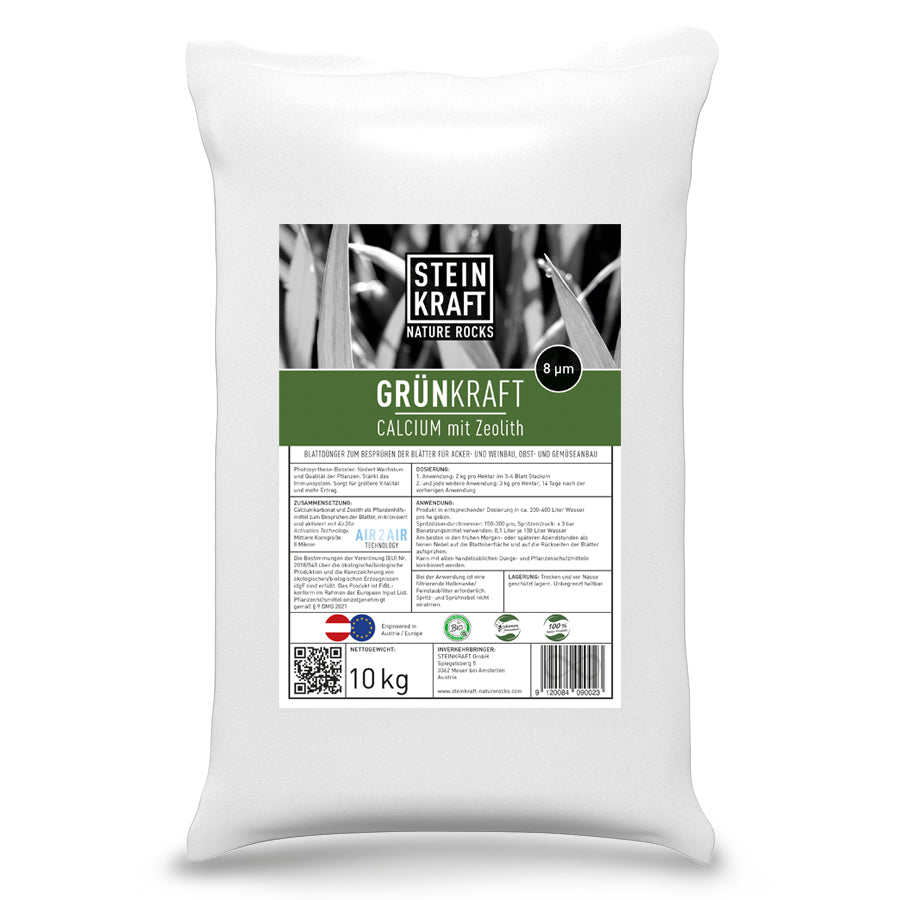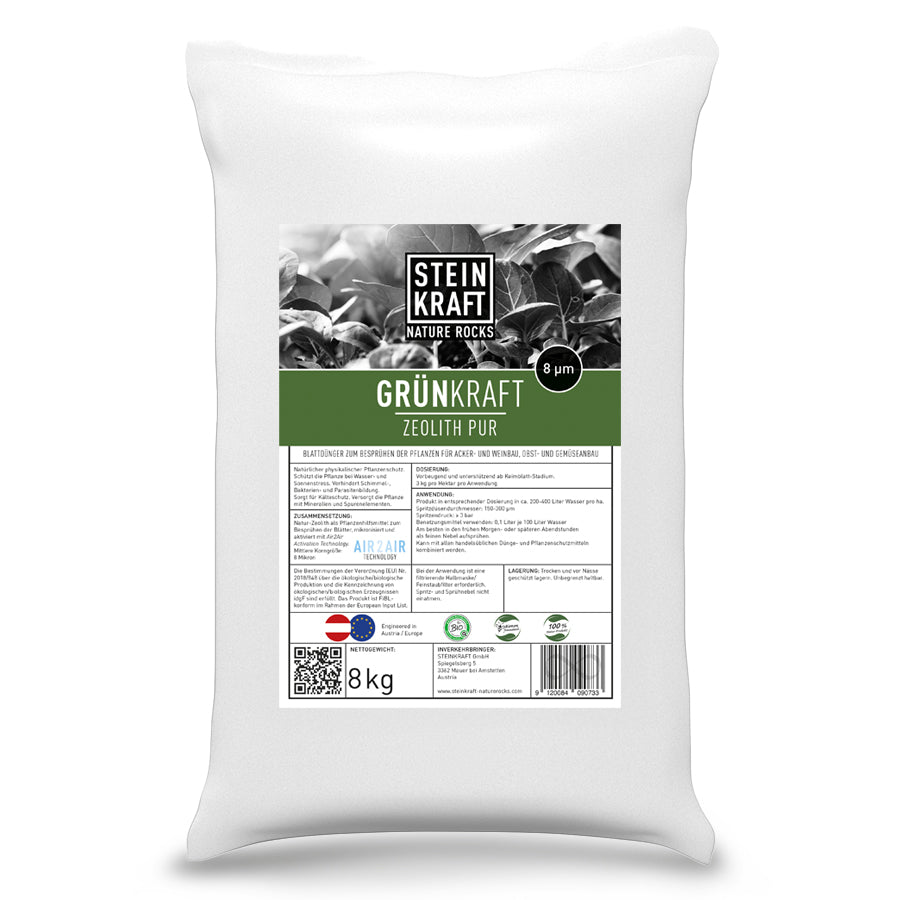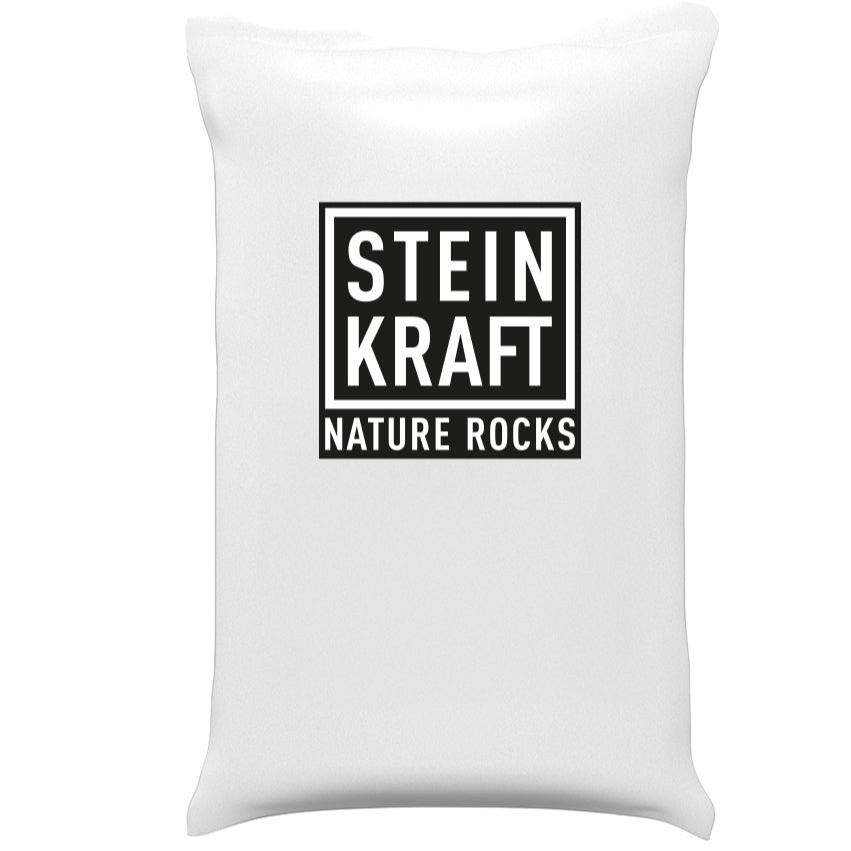Zeolite in agriculture
In a time when our relationship with nature is more important than ever, we increasingly feel the desire to care not only for each other, but also for the Earth itself. Love for nature and care for our planet have become an attitude that demands sustainable action and mindful use of our resources.
What we once suspected is now scientifically proven: There are ways to give something back to nature while simultaneously making agriculture more resource-efficient and effective.
A promising approach lies in the use of zeolite, a natural mineral that could revolutionize not only the soil but also agriculture. Zeolite supports water retention, optimizes nutrient distribution, and promotes stable, sustainable soil quality – and this is not just theory, but supported by clear research results.
This makes it clear: We no longer need to convince people to appreciate sustainable methods; the advantages are obvious and tangible.
Be inspired by how zeolite can help guide the future of agriculture into a new, mindful balance.

Studies on the effects of zeolite in agriculture
The ECO-ZEO project, which ran from 2012 to 2016, was launched as part of the European research initiative FP7 (7th Framework Programme of the European Union). This study aimed to explore the potential applications of zeolite – a natural mineral with unique properties – in the agricultural sector.
Zeolite is characterized by its ability to store water and nutrients and release them slowly as needed. This property offers great potential for agriculture, especially in regions struggling with water scarcity and nutrient depletion in the soil. Through its water-storing and nutrient-binding capabilities, zeolite could help increase fertilizer efficiency, improve soil quality in the long term, and reduce the use of chemical additives.
The ECO-ZEO project conducted extensive laboratory and field studies to thoroughly investigate the effects of zeolite on soil and plant growth. The results are promising: zeolite showed significant benefits in water retention , improved nutrient availability , and supported plant growth , making the soil more resilient to environmental stresses.
The study provides a scientific basis that clearly confirms the practical benefits of zeolite for sustainable agriculture. With these findings, zeolite is a serious option for more environmentally friendly and resource-efficient agriculture, offering not only economic but also ecological advantages.
Zeolite: Studies and results including experimental setup
I enjoy studying research and especially understanding the results. For that, I personally need to know the experimental setups. Specifically, what was investigated and how. This makes it more plausible, and this context helps me interpret the results better.
Here is a detailed summary of each study, including the experimental setups:
-
Laboratory study on water retention
- Objective of the study : Analysis of the ability of zeolite to store water in the soil and release it when needed.
- Experimental setup : Zeolite samples were mixed into soils with varying water contents. The samples were then monitored in a controlled laboratory environment, simulating water input and output. Measurements of the amount of water retained and released from the soil were taken at regular intervals.
-
Results : Zeolite exhibited a high water absorption capacity, which kept soil moisture stable for extended periods. This is particularly advantageous in regions with low rainfall.

-
Laboratory study on nutrient binding and release
-
Objective of the study : To investigate the ability of zeolite to bind nutrients such as nitrogen and potassium in the soil and release them slowly to the plants.
-
Experimental setup : Zeolite samples were treated with nutrient solutions containing nitrogen and potassium. The treated samples were then incorporated into soil samples and analyzed under laboratory conditions. Soil and water samples were taken at regular intervals to determine the nutrient content and release rates.
-
Results : Zeolite proved to be an effective carrier for nutrients, as it enables a gradual release of nutrients, which increases the efficiency of fertilizers and provides plants with a constantly available nutrient source. This means that zeolite does not release everything at once, overwhelming the plant and causing it to oversaturate, but rather does so gradually.

-
Objective of the study : To investigate the ability of zeolite to bind nutrients such as nitrogen and potassium in the soil and release them slowly to the plants.
-
Field trials to promote plant growth
-
Experimental setup : Plots were established where zeolite was added to the soil in varying doses. Control plots without zeolite served as a comparison. The plants were observed throughout the entire growing season, and parameters such as plant height, number of leaves, leaf color, and yield were documented.
-
Results : The plants in the zeolite-treated soils showed improved health and higher yields. The stable water and nutrient levels led to better growth rates and reduced susceptibility to stress.

-
Experimental setup : Plots were established where zeolite was added to the soil in varying doses. Control plots without zeolite served as a comparison. The plants were observed throughout the entire growing season, and parameters such as plant height, number of leaves, leaf color, and yield were documented.
-
Study on soil quality and structure
-
Objective of the study : To assess the effects of zeolite on the physical soil structure and long-term soil quality.
-
Experimental setup : Zeolite was incorporated into the soil at various concentrations, and samples were taken over several months. Soil structure, density, permeability, and water retention capacity were regularly analyzed using laboratory measurements. Changes in soil quality were documented and compared with control samples without zeolite addition.
-
Results : Zeolite improved soil structure by promoting aeration and permeability. This soil improvement had positive effects on the root system of plants and their ability to absorb water and nutrients.

-
Objective of the study : To assess the effects of zeolite on the physical soil structure and long-term soil quality.
-
Environmental impact study
-
Objective of the study : Analysis of the ecological impacts of using zeolite compared to conventional fertilizers.
-
Experimental setup : Zeolite and conventional fertilizers were applied individually and in combination to various test plots. Soil and water samples were taken regularly to measure nitrogen and phosphorus leaching into deeper soil layers and adjacent water sources. Emissions and environmental impact from fertilizers were compared with and without the addition of zeolite.
-
Results : Zeolite showed more environmentally friendly results, as it reduced the need for chemical fertilizers and thus decreased nutrient runoff into water sources. This makes zeolite a more sustainable option for agriculture.

-
Objective of the study : Analysis of the ecological impacts of using zeolite compared to conventional fertilizers.
-
Economic analysis
-
Research objective : Calculation of the costs and potential benefits of using zeolite in the agricultural sector.
-
Experimental setup : The analysis was conducted through a combination of field trials and economic calculations. Data on yields, water savings, reduced fertilizer costs, and the initial material costs for zeolite were considered. Long-term benefits such as improved soil quality and reduced fertilizer use were also included in the calculations.
- Results : The study showed that, despite the initial investment in the material, the use of zeolite enables long-term cost savings through more efficient water and nutrient use as well as increased yields.
-
Research objective : Calculation of the costs and potential benefits of using zeolite in the agricultural sector.
These studies provide a detailed basis for evaluating the effectiveness of zeolite in agriculture at various levels, including water and nutrient management, soil health, environmental impacts and economic benefits.

Conclusion: Studies on Zeolite
As someone who grew up on a farm and now works as a psychologist and organizational consultant, the mindful stewardship of our Earth is particularly important to me. My journey has taken me from the daily practice of a natural cycle on the farm to working with individuals and organizations who want to develop a greater awareness of their impact. Today, my goal is to offer not only knowledge but also sustainable products that help us all be part of a new, respectful relationship with the Earth.
The findings from zeolite research fill me with hope and joy. Here we have a product that strengthens the connection between our Earth and our actions, scientifically sound and with promising potential. Zeolite is a gift of nature that shows us how we can conserve our soil's resources while simultaneously securing the foundations of life for future generations. I am convinced that together we can contribute to a more sustainable Earth – and I am delighted to be part of this movement.
👉 Here you'll find the product of the month and a good overview of all STEINKRAFT product lines.
👉 Here you can find all STEINKRAFT products at a glance - directly in the shop





















